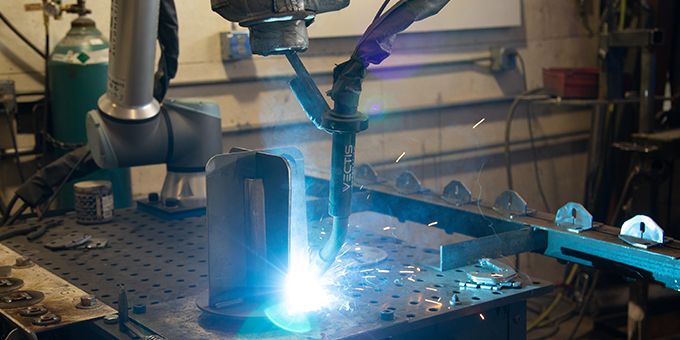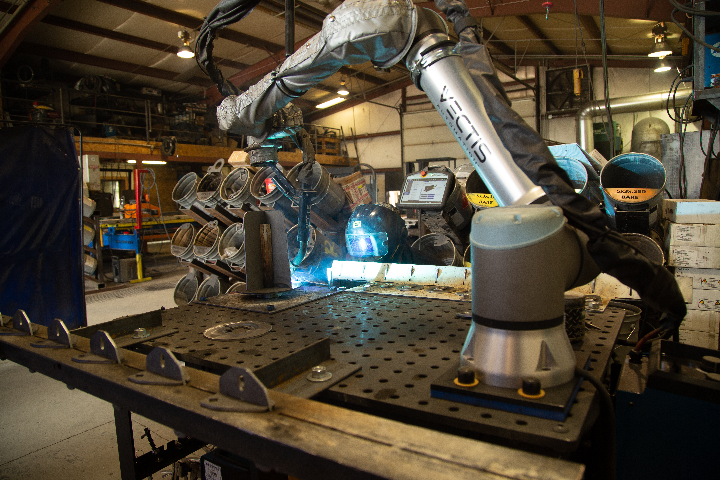A Vectis Cobot Welding Tool now handles a wide range of welds, enabling quick change-overs and optimized production. MT Solar overcame labor shortages and freed current staff from repetitive welding tasks while successfully handling a 300% surge in demand.
 MT Solar Overcomes Labor Shortages, Boosts Quality and Improves Productivity with the Universal Robots-powered Vectis Cobot Welding Tool
MT Solar Overcomes Labor Shortages, Boosts Quality and Improves Productivity with the Universal Robots-powered Vectis Cobot Welding Tool

Case Study from | Universal Robots
MT Solar is a solar mounting equipment manufacturer based in the picturesque community of Charlo, Montana. The company designs and manufactures mounting structures for solar modules of all sizes. A Vectis Cobot Welding Tool powered by Universal Robots now handles a wide range of welds, enabling quick change-overs and optimized production. MT Solar overcame labor shortages and freed current staff from repetitive welding tasks while successfully handling a 300% surge in demand.
On the morning MT Solar's brand new DIY Cobot Welding Tool arrived at the company's Charlo facility in rural Montana, anticipation had been building for some time. “It made for a very interesting first few moments with the robot,” says Travis Jordan, owner and president, MT Solar: “The robot shows up on the truck and of course I’m all excited about it. I walk out of the office and I’ve got employees already cutting shrink wrap off the robot and getting ready to set something up. I was like, 'Hang on! I want to play!' We had production parts running that same afternoon.”
Those first production parts were the culmination of a process that had begun some months prior as MT Solar was scrambling to deal with seasonal labor shortages. One day, one of MT Solar's welders handed the owner a news article on welding robots. “He said 'I really think you should look into this, it would be a good solution for our team,'” recalls Jordan. “And I’m like, 'Well, if you got one of the operators saying you need to look into robotics, you’ve got a reason you should be doing something here.'” His hiring woes reflect a national trend; the American Welding Society predicts a potential shortfall of 400,000 welders by 2025.
Demand spikes and labor shortages spur automation adoption
MT Solar experiences a 300% jump in demand for its solar mount products every summer, but has been unable to find skilled welding workers to handle the seasonal uptick at its rural manufacturing plant. Inspired by the welder's suggestion, Jordan researched conventional welding robots, but found them inflexible and best suited to huge batches of the same item. Finding a flexible automation solution was crucial for MT Solar as the company makes many different types of mounting parts, often in high mix/low volume batches. Jordan explains: “We have many products that go together—think of us as a 'Solar Ikea,' if you will—where all the pieces have to be assembled in the field. If I don’t have all the other parts that go with it, I can’t ship anything.”
The cost of conventional automation is compounded by the hassle associated with programming and set up, adds Jordan. “At first it might look like a good idea to use traditional robots, but when you look at the time and resources to get them up and running and programmed, it was not the route we wanted to take. Conventional robots aren't very flexible. They can’t handle a mixed bag. The envelope is too small. Or the fixturing can’t be manipulated properly, and the cost would have gone through the roof,” says Jordan, adding that the company preferred a solution that wouldn’t require safety guarding and that existing operators could handle.
Collaborative robots upend conventional automation paradigms
When MT Solar discovered Universal Robots, the paradigm changed. “The big difference is the 'collaborative robot approach' of being able to work with the robot, and it being so teachable and so easy to run,” says Jordan.

While traditional welding robots require safety cages and can look “kind of like a nightmare,” cobots offer safe human-robot collaboration in close proximity without fences, Jordan notes, further increasing the appeal of cobot-powered welding solutions. “When I zoomed in and discovered Vectis Automation’s Cobot Welding Tool, it became obvious that this combination was the right way to go”, says Jordan, adding: “You can work right beside the cobot as it is moving and welding. My guys can have their hood down and be right there, changing parts out with no safety guarding and no concerns about safety. They’ve been very, very comfortable working with it.”
Josh Pawley, co-founder of Vectis Automation, says his company initially faced some skepticism around cobots and welding. “There’s been a stigma that cobots can’t go into heavy industrial environments, but what our customers are saying and seeing is that that’s not true,” he says. “They are welding thin gauge materials, all the way down to 16 gauge, all the way up to half-inch and thicker materials. Cobots are meant for industrial environments and they can bring the benefits of DIY ease of use, flexibility, a smaller footprint and a lower all-in cost to shops of all sizes,” states Pawley, adding that the Vectis Cobot Welding Tool, when compared to traditional robotic welding cells, can be 25 to 40 percent less with freight, time to production, training, setup, install and commissioning factored in.
MIG welding in 38 minutes takt time
MT Solar's implementation of the Vectis Cobot Welding Tool is based on extensive human-robot collaboration. Operators set up the cell with jigs, supply the parts and program the system through an intuitive 3D interface directly integrated on the cobot’s teach pendant through Vectis’ URCap software plugin supplied. The pendant includes a full weld library developed by Vectis Automation, providing standard settings for common weld jobs, including Pattern and Tack tools.
“I am by no means a certified welder,” says Jordan. “I’ll just grab any of the guys out of the shop that are welders, and I’ll say, ‘Okay, I’ll run the pendant. You go ahead and run the torch and put it where you want it. Where do you want the weld to start; where do you want it to stop; what angle do you want it to do?’ And we’ve thought through some very advanced welds.”
DIY programming complete, the robot autonomously runs a full MIG welding cycle. The UR10e welds six to eight parts in each cycle. Typically, these are small parts, including lock collars, beam clamps and weld nuts. The cobot welds these in a predefined order and completes 4-12 parts per run with no batching. When it has completed its welding tasks, humans can reload parts and restart the system, if required, or quickly program a new welding job with fresh parts. The cobot is responsible for welding specific lists of parts every 38 minute takt time shift. Operators work collaboratively with the cobot, loading and unloading during cycles, maximizing the 51” reach of the UR10e cobot arm to cover multiple different fixtures.
Low barriers to entry
The best thing about the system is that you don't have to be a rocket scientist to use it, says MT Solar’s operations manager, Mike Gillin, a certified welder at MT Solar: “I’m a welder by trade, but I didn’t know anything about robots, and I’m not very computer-savvy. Curiosity attracted me to the robot and I was really surprised at how easy it was to figure it out.” Meanwhile, Vectis the flexible financing and rent-to-own options enabled MT Solar to test out the entire system without the financial commitment from the outset. “This is a system that I can rent or lease for a very short period. I can afford that. If it doesn’t work, I’m not saddled with the thing. That made it really easy for us to get started,” says Jordan.
The tangible ROI of the system is clear, since it adds another welder to the team, Jordan adds, which provides “a real clean one-and-a-half, two-year ROI, just on hard number labor savings.” The intangible ROI is “probably even more valuable,” notes Jordan, due to the cobot’s net improvement of the shop and a “far-reaching impact on both customers and employee morale.”
Repeatability, improved quality & competitiveness enhanced
Human welding can accommodate –and introduce– a lot of variance, says operations manager, Gillin, especially when it comes to monotonous work and relying on the ‘calibrated thumb’. “We’ve built up to 7,500 small parts over a winter. For an operator to sit and do that; you can tell where they’ve gotten sick of it, and some of those parts end up being scrapped.” says Gillin. The cobot welder now performs that repetitive work. For owner Jordan, the system offers the repeatability that manufacturers crave and helps MT Solar maintain consistent product quality. “Our customers are always excited when we tell them, ‘Hey, you know, that part was welded on a robot.’ They go to put it on, and it looks exactly the same as the last one and they look high quality,” says Jordan. “I think Universal Robots’ system with Vectis is the best one I’ve run across. It’s wonderful.”
Furthermore, the consistency and flexibility of the system enables MT Solar to compete with large corporations,” says Jordan. “Having a robot that can quickly be transitioned to different jobs and different tasks is paramount to our success. It allows us to combine industrial quality and scalability with the innovation and the nimbleness of a small company, which we think is an extremely powerful combination.”
MT Solar plans to acquire more cobots soon for new tasks such as manipulation of heavy and larger parts, which will also alleviate some of the lifting performed by employees. As operations manager Gillin puts it: “We’ve got a shop full of people that will come up with ideas just based on their exposure to it.”
The content & opinions in this article are the author’s and do not necessarily represent the views of AltEnergyMag
Comments (1)
Featured Product

